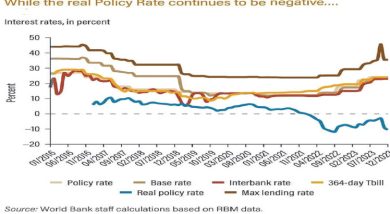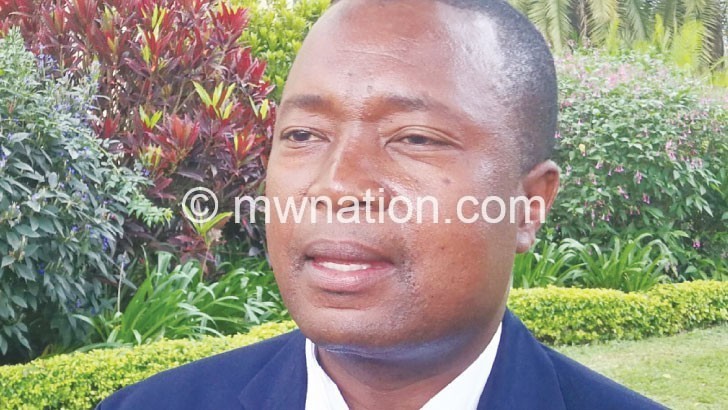Malawi slumps on World Bank Doing Business Index
Malawi has slumped 10 places on the latest World Bank Doing Business 2014 (DB14) report, improving on one indicator out of 10, signaling that the country did not make meaningful reforms on the ease of doing business
In the joint World Bank and International Finance Corporation (IFC) report released on Tuesday covering 189 economies, Malawi made strides on registering property where it has jumped 11 places to 85 from 96 last year, largely because the government made the transferring of property easier by reducing the stamp duty.
Overall, Malawi has gone down to 161 from 171 the year before, but the report shows that on the distance to frontier (DTF), the country, with a gross national income (GNI) per capita income of $320 [K130 240], improved by 0.28 percentage points to 46.16 percent in 2014 from 45.88 percent the year before.
The drop in the rankings makes difficult the job of Minister of Industry and Trade Sosten Gwengwe, whose ministry spearheads the doing business reforms. This also means that the dream by President Joyce Banda to ensure that the country is in the top 100 by the end of this year is far-fetched.
The biggest drop of them all by 26 places is on paying taxes trailed by resolving insolvency, 14 places, starting a business seven places and dealing with construction permit five places, according to the report, which is a result of the perception of private sector representatives on the ease of doing business.
Malawi has remained stagnant on protecting investors and trading across borders where it has been ranked at 80 and 176 respectively, according to the report.
On getting electricity, the country dropped one place to 183, four places down on getting credit to 130 and one place down on enforcing contracts, according to the report titled ‘Understanding regulation for small and medium-size enterprises.’
According to the 11th edition of the report, doing business does not measure all aspects of the business environment that matter to firms and investors.
“For example, it does not measure the quality of fiscal management, other aspects of macroeconomic stability, the level of skills in the labour force, or the resilience of financial systems. Its findings have stimulated policy debates worldwide and enabled a growing body of research on how firm-level regulation relates to economic outcomes across economies,” says the report.
In sub-Saharan Africa, the report found that many countries engaged in reforms aimed at reducing burdensome regulations and building stronger legal institutions.
In 2012/13, more than twice as many African economies in the region made reforms, compared to 2005 and that out of 20 economies that have most improved business regulation since 2009, nine are in sub-Saharan Africa: Benin, Burundi, Côte d’Ivoire, Guinea-Bissau, Liberia, Rwanda, Sierra Leone and Togo.
The DB14 report finds that the pace of business regulatory reform continues to accelerate following the financial crisis of 2008-09, adding that if economies around the world were to follow best practices in regulatory processes for starting a business, entrepreneurs would spend 45 million fewer days each year satisfying bureaucratic requirements.
World Bank Group president Jim Yong Kim is quoted as saying that a better business climate that enables entrepreneurs to build their businesses and reinvest in their communities is key to local and global economic growth.
“Doing Business shows that economies with better business regulations are more likely to empower local entrepreneurs to create more jobs – another step in the right direction towards ending extreme poverty by 2030,” he said.
Singapore tops the global ranking on the ease of doing business, and joining it on the list of the top 10 economies with the most business-friendly regulatory environments are Hong Kong, China, New Zealand, the United States, Denmark, Malaysia, the Republic of Korea, Georgia, Norway and the United Kingdom.
In addition to the global rankings, every year DB reports the economies that have improved the most on the indicators measured since the previous year. The 10 economies topping that list this year are (in order of improvement) Ukraine, Rwanda, the Russian Federation, the Philippines, Kosovo, Djibouti, Côte d’Ivoire, Burundi, the former Yugoslav Republic of Macedonia, and Guatemala.






What must also be highlighted is that Singapore has retained its number 1 position as the world leader on this report of doing business. This is a country that was at the same level of development as Malawi in 1964. Malawi is not moving, we are not competitive and we are not yet on an economic growth ladder. In order for us to win in this competitive world, we must transform the economy not by words but by being professional and systematic in our approach. If the president has set the goal of Malawi rising to 100 in ranking (..and it is possible .. Zambia is ranked 83) then all supporting staff and management in the Ministry of Business must take that very seriously and follow it through with vigour and a systematic approach of using the key performance indicator matrices and acting on the specific topics to gain points for the country. For example, why do people have to go to BT/LL to register for a company and not just do it online or at least in their districts and sub-districts?
Two key areas we were marked down on last year were a) making construction permits more expensive….why did we do that? and b) introduction of mandatory pension contribution for companies. It is not clear to me why this was a mark down for Malawi since most companies world over contribute to their employees pension either as national insurance contribution (NIC), superannuation or as the case is for Singapore, to a central provident fund (CPF). Given our president’s clear and unequivocal stated support for this report, the Ministry of Business is fully empowered to propose sweeping policy changes that will enhance the business investment environment by thinking through options. By the way, Burundi and Zim have now officially overtaken Malawi. Sigh! Never mind! if it makes Malawians feel better, our brothers and sisters in South Africa, under the dynamic leadership of you know who, are also sliding… towards us …maybe in a “typical African” solidarity, to meet us halfway (lol). South Africa has officially been overtaken by a previously failed state, Rwanda in this report.